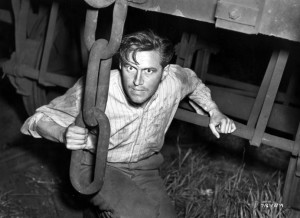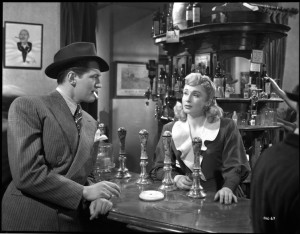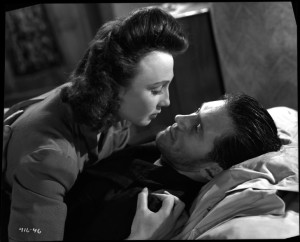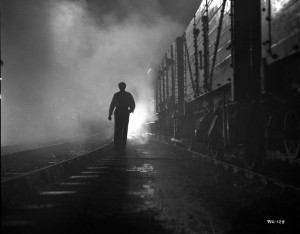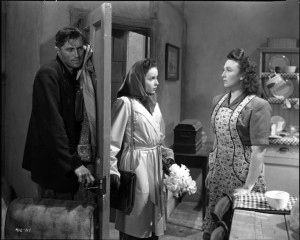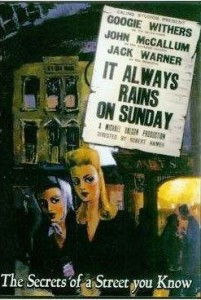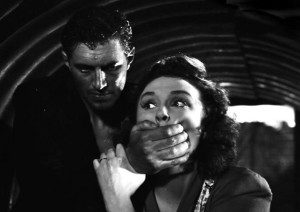It Always Rains on Sunday ***** (1947, Googie Withers, John McCallum, Jack Warner, Edward Chapman, Susan Shaw, Patricia Plunkett) – Classic Movie Review 2507
Director Robert Hamer’s bleak but beautiful 1947 Ealing Studios British working-class drama is set in London’s East End. It’s not a soap opera but a work of art, a mix of early Sixties-style kitchen-sink movie and Forties noir thriller.
It captures the postwar English zeitgeist. The particular Sunday of the film is 23 March 1947, and the location is Bethnal Green, an area suffering the effects of bombing and post-war deprivation.
Googie Withers stars as bossy housewife Rose Sandigate, a former barmaid married to middle-aged George (Edward Chapman), with two teenage daughters (Susan Shaw, Patricia Plunkett) from a previous marriage. John McCallum also stars as Tommy Swann, jailed some years earlier for robbery with violence, escapes from prison and is discovered by former lover Rose hiding in the family’s air-raid shelter.
The fleeing convict asks his married old flame (Googie Withers) to hide him until nightfall. Reluctant, but still in love with him, she eventually allows him to hide in her bedroom, which she then keeps locked.
There’s a finely etched if theatrical and artificial picture of 40s East End life, aiming at truth via heightened reality. There’s a striving for a poetic dimension in the handling as well as in the fatalist theme of doomed love in a drab urban setting, as though the film-makers were influenced by 30s French cinema of the poetic realism movement. This is a mood and atmosphere emphasised in Douglas Slocombe’s masterly black and white cinematography and Georges Auric’s score.
Screen-writers Hamer, Angus MacPhail and Henry Cornelius (also the producer) are working from the novel by Arthur LaBern. And they ensure that the film is marvellously scripted, with the characters, mood and dialogue totally convincing and exactly right. It is also splendidly realised by director Hamer, encouraging marvellous performances.
At the centre of things, there’s delicious playing from Withers and McCallum (who married soon after filming), as well as from co-stars Jack Warner (typecast as Detective Sergeant Fothergill), Sydney Tafler and Jimmy Hanley. And there’s a long list of Ealing Studios stalwarts in support: John Carol, Jane Hylton, Hermione Baddeley (as doss-house keeper), Alfie Bass, John Salew, John Slater, Gladys Henson, Patricia Plunkett, David Lines, Betty Anne Davies, Meier Tzelniker, Frederick Piper, Michael Howard, Edie Martin and Vida Hope.
It was one of the most popular movies at the British box office in 1948 and it has been finally re-evaluated from has grown from engrossing slice-of-life drama to one of the most overlooked achievements of post-war British cinema. It triumphed in America in screenings in New York in 2008 as part of a British Film Noir season. The film was honoured with a theatrical re-release in the UK in 2012.
© Derek Winnert 2015 Classic Movie Review 2507
Check out more reviews on http://derekwinnert.com


